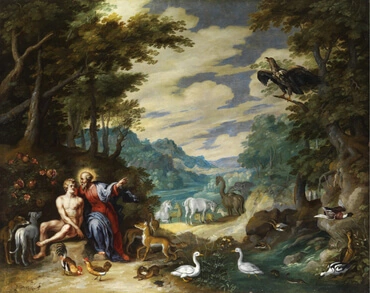1
Dies ist das Buch von Adams Geschlechtern. An dem Tage, da Gott Adam schuf, machte er ihn im Gleichnis Gottes.
2
Mann und Weib schuf er sie, und er segnete sie und gab ihnen den Namen Mensch, an dem Tage, da sie geschaffen wurden. -
3
Und Adam lebte hundertdreißig Jahre und zeugte einen Sohn in seinem Gleichnis, nach seinem Bilde, und gab ihm den Namen Seth.
4
Und die Tage Adams, nachdem er Seth gezeugt hatte, waren achthundert Jahre, und er zeugte Söhne und Töchter.
5
Und alle Tage Adams, die er lebte, waren neunhundertdreißig Jahre, und er starb. -
6
Und Seth lebte hundertfünf Jahre und zeugte Enos.
7
Und Seth lebte, nachdem er Enos gezeugt hatte, achthundertsieben Jahre und zeugte Söhne und Töchter.
8
Und alle Tage Seths waren neunhundertzwölf Jahre, und er starb. -
9
Und Enos lebte neunzig Jahre und zeugte Kenan.
10
Und Enos lebte, nachdem er Kenan gezeugt hatte, achthundertfünfzehn Jahre und zeugte Söhne und Töchter.
11
Und alle Tage Enos' waren neunhundertfünf Jahre, und er starb. -
12
Und Kenan lebte siebzig Jahre und zeugte Mahalalel.
13
Und Kenan lebte, nachdem er Mahalalel gezeugt hatte, achthundertvierzig Jahre und zeugte Söhne und Töchter.
14
Und alle Tage Kenans waren neunhundertzehn Jahre, und er starb. -
15
Und Mahalalel lebte fünfundsechzig Jahre und zeugte Jered.
16
Und Mahalalel lebte, nachdem er Jered gezeugt hatte, achthundertdreißig Jahre und zeugte Söhne und Töchter.
17
Und alle Tage Mahalalels waren achthundertfünfundneunzig Jahre, und er starb. -
18
Und Jered lebte hundertzweiundsechzig Jahre und zeugte Henoch.
19
Und Jered lebte, nachdem er Henoch gezeugt hatte, achthundert Jahre und zeugte Söhne und Töchter.
20
Und alle Tage Jereds waren neunhundertzweiundsechzig Jahre, und er starb. -
21
Und Henoch lebte fünfundsechzig Jahre und zeugte Methusalah.
22
Und Henoch wandelte mit Gott, nachdem er Methusalah gezeugt hatte, dreihundert Jahre und zeugte Söhne und Töchter.
23
Und alle Tage Henochs waren dreihundertfünfundsechzig Jahre.
24
Und Henoch wandelte mit Gott; und er war nicht mehr, denn Gott nahm ihn hinweg. -
25
Und Methusalah lebte hundertsiebenachtzig Jahre und zeugte Lamech.
26
Und Methusalah lebte, nachdem er Lamech gezeugt hatte, siebenhundertzweiundachtzig Jahre und zeugte Söhne und Töchter.
27
Und alle Tage Methusalahs waren neunhundertneunundsechzig Jahre, und er starb. -
28
Und Lamech lebte hundertzweiundachtzig Jahre und zeugte einen Sohn.
29
Und er gab ihm den Namen Noah, indem er sprach: Dieser wird uns trösten über unsere Arbeit und über die Mühe unserer Hände wegen des Erdbodens, den Jehova verflucht hat.
30
Und Lamech lebte, nachdem er Noah gezeugt hatte, fünfhundertfünfundneunzig Jahre und zeugte Söhne und Töchter.
31
Und alle Tage Lamechs waren siebenhundertsiebenundsiebzig Jahre, und er starb. -
32
Und Noah war fünfhundert Jahre alt; und Noah zeugte Sem, Ham und Japhet.







